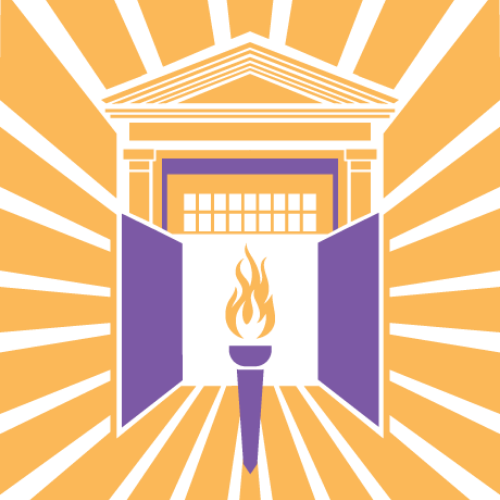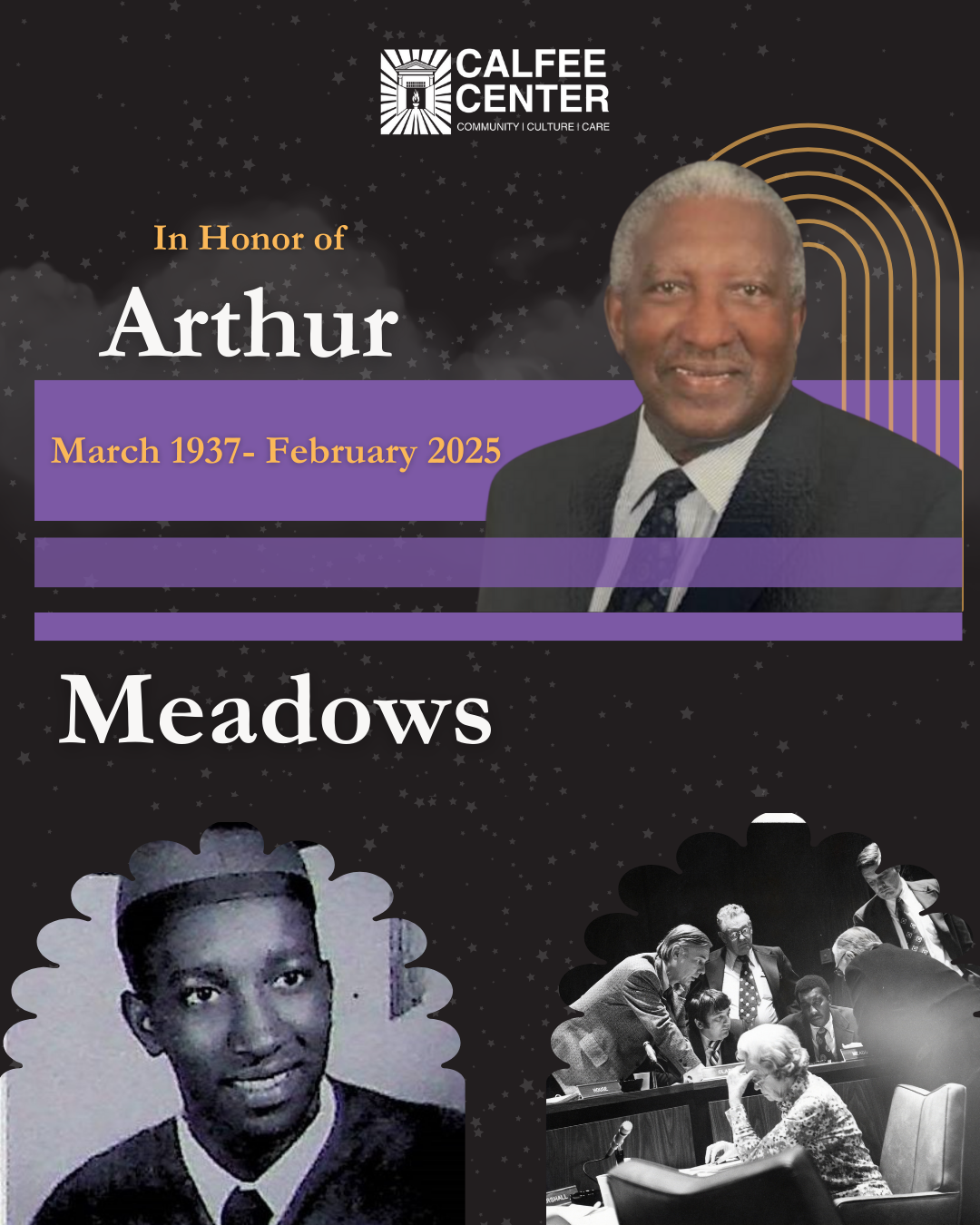In Honor of Mr. Arthur L. Meadows (1937-2025)
Authored by: Clay Adkins, Research Director of the Calfee Center & 23/54 Project
Mr. Arthur L. Meadows, 87, a highly respected civic leader and pillar of the Pulaski community, passed away on February 20, 2025. A celebration of life was held on his 88th birthday on Saturday, March 8, 2025 at the Randolph Avenue United Methodist Church in Pulaski. The Calfee Center extends its warmest and sincerest condolences, sympathies, and prayers to his family, friends, and the Pulaski community. Mr. Meadows was the first African American elected to the Pulaski Town Council in 1972; he was reelected in 1976, and was appointed to an additional term in 1980. According to a 1980 Roanoke Times article, Meadows was one of only two African Americans in the New River Valley serving elected government positions up to 1980, the other African American elected government official was his late brother, James Meadows of the Dublin Town Council.
Arthur Meadows and Peggy Joyce Stiger (1934-2024) married on June 2, 1962 at the Slaughter’s Chapel Methodist Church in Draper with Rev. H.L. Johnson as the officiant. Arthur and Peggy Joyce Meadows were married for sixty-two years. Arthur Meadows was a dedicated employee of Hercules Inc. at the Radford Army Ammunition Plant (RFAAP) where he worked as an Industrial Relations Supervisor and Equal Employment Opportunity Coordinator. Mr. Meadows was the first African American Supervisor at the Radford Army Ammunition Plant, and one of the first Black people to be employed at the Radford location. Before returning to Pulaski, VA, to work at the RFAAP, Meadows worked in the U.S. State Department, Passport Division in Washington, D.C. Meadows completed his early education at the Calfee Training School and graduated from Christiansburg Institute in 1955. He later graduated from Morristown Junior College in Morristown, TN, and received his Bachelor of Science from Tennessee A&I State University in Nashville, TN. Mr. Meadows was an active member of the Pulaski community for several decades, including volunteering as an Election Day poll worker and working behind the scenes with the local Pulaski Chapter of the NAACP. Meadows was transferred to the Sunflower Ammunition Plant in Olate, Kansas, where he retired.
Arthur Meadows was born in Newbern, Virginia, to the late Henry and Helen Meadows on March 8, 1937. Henry L. Meadows (1884-1973) was a factory laborer and Helen Lambert Meadows (1909-1984) was a household worker during their working years. The Meadows family were dedicated church attendees who worshiped at the First Baptist Church on Magazine Street, the New Century United Methodist Church, St. Paul AME Church in Kansas, and the Randolph Avenue United Methodist Church for several decades. Arthur Meadows served in many capacities in these churches throughout his life, including a few notable duties as Church Trustee member, Worship Committee member, and Lay Speaker.
The Meadows family, consisting of Henry, Helen, Vinnie Mae, Alberta, Charles, Andrew, James, and Arthur, moved to Pulaski when Arthur was an infant. Arthur fondly remembered his grandmother, Mary, stating “my grandmother lived with us, and she was like a second mom. She was with us while my mom and dad worked, so we were very close.” Growing up in Pulaski, Arthur Meadows recalled that he “lived as far southwest as you can go besides going to the mountains," and that he “lived on the South side, about as far South as you possibly could go, called Dude Hill.” When discussing his childhood neighborhood, Meadows reminisced, “My neighborhood was a poor neighborhood, but we were happy. I don’t guess we realized we were as poor as we were because everybody was similarly situated. When I lived on Dude Hill, it was primarily Black people, but it was a mixed neighborhood in both places, and we socialized. We played together.”
In 1944, at six years old, Arthur Meadows began his education at the Calfee Training School. He completed his elementary education in the 1951-1952 school year. In an oral history interview with the Calfee Center in 2023, Meadows stated, "I attended Calfee Elementary School and I enjoyed it and I was glad to go to school. I came from a home where my parents had not finished elementary school or any other. They weren’t totally illiterate, but pretty much so. I was just happy to go to school, to learn to read and write. And from that, I was able to write letters not only for Black folks, but for white folks, too. I could write letters, do other things that other people were not able to do as a very young boy.”Mr. Meadows was a passionate advocate for education, literacy, and writing—skills first sparked in him during his time at the Calfee Training School. He vividly remembered his teachers from Calfee, specifically, Gretchen Washington Holmes, expressing “that’s where I learned to read and write, and I learned to read and write fairly well. That was the grade that I remember… But that year [first-grade] and then the third and fourth grades were good because I advanced and I’d get teachers, one of them was Mrs. Ward, and she took a special interest in me and encouraged me to study, and to concentrate, pay attention. She could be pretty strict, but she was very kind and generous.” Meadows also recalled the daily work that went into attending Calfee, stating, "to get to Calfee School, we had to walk. When I came to school, I took a route to walk the streets, the regular streets. When I would leave in the evening, generally we would go up Magazine Street and there was a path through where Magnox was, and it would take you to the big railroad section of the Dude Hill section and take a shortcut. But it was a pretty good walk. If you walked the streets, it would be like two and a half or three miles each way.”
Once he completed his education at Calfee, Meadows “went straight to high school. There was no middle school after elementary school when I grew up.” Meadows attended the Christiansburg Industrial Institute in Christiansburg, VA. He recalled the teachers at CI to be “quiet-friendly and nice” but that he “wasn’t able to participate in sports and other things after school because I had to work after school to have money, the clothes, and the things that I wanted. I cleaned stores and houses, mowed grass. Back in those days, the jobs in the stores were not available to people of color. And even in the factories, I couldn’t get a job in the summertime, so I mowed grass and did any type of work that was available. Except I didn’t like to shine shoes because I didn’t like the language that was often around the shoeshine stand. And I wasn’t going to dance and I wasn’t going to sing for money. But I did everything else that I could that was decent to make ends meet.” Meadows also explained that “we [the Meadows family] lived twenty-eight miles from there, so it was quite a distance.”
These experiences detailed by Mr. Meadows, involving an extended trip to school each weekday, and the missed opportunities to participate in afterschool or extracurricular activities due to economic hardship and long distances, were experienced by several African Americans of the New River Valley during the twentieth century. These experiences were amplified in the 1947 NAACP equalization lawsuit, Corbin et al. v. County School Board of Pulaski County, Virginia, launched by Dr. P.C. Corbin on behalf of his son, Mahatma Corbin, and twenty-three Black parents and guardians on behalf of fifty-four Black children, who served as plaintiffs for the Corbin lawsuit. Arthur Lee Meadows graduated from Christiansburg Industrial Institute in 1955, despite the experiences of racial discrimination and segregation in twentieth-century Virginia.
In 1972, Arthur Meadows was elected as the first Black member of the Pulaski Town Council. Meadows is often pictured working, volunteering, and advocating for the Pulaski community in the Southwest Times, Roanoke Times, and many other local and regional newspapers throughout the 1970s and 1980s. Pulaski Councilman Meadows initially retired at the end of his second term on July 1, 1980. However, after the resignation of a Pulaski Councilman, Mr. Meadows was appointed to fill the vacancy. From a September 7, 1980, Roanoke Times & World News article entitled “Blacks Fight Traces of Racism in Small Towns,” Meadows was prominently featured on a first page story. New River Valley Bureau journalist Doug Waters asked Mr. Meadows, “why would he come out of retirement so soon?” Meadows was quoted as saying that serving the Pulaski community on Town Council, “sort of gets in your blood, although it can be a whipping at times.” In the 1980 article, Meadows had this to say about his experience as the first African American to serve on the Pulaski Town Council, “he did not feel unwelcome when he took his seat on the council, although some people still look at him as a Black man first, then as a councilman rather than vice versa,” and that “despite all the niceness around the (council) table and the formal gatherings, there are still some racial feelings.” Meadows continued when he said, “that the strict division [racial segregation] between Black and white that was present years ago in Pulaski can still be found today. You can’t forget all the things of the past.” The Calfee Center will ensure that generations of Black community members who dismantled and challenged institutional racial discrimination are remembered and that the history of racial discrimination and segregation in Pulaski is accurately preserved. Moreover, we will ensure that the power of love, kindness, and community service exemplified by Mr. Arthur L. Meadows throughout his life and career is a long-standing legacy for generations to come.
Bibliography:
Calfee Center Oral History Interview. Arthur L. Meadows. African American Heritage Center at
Calfee, October 4, 2021.
Calfee Center Oral History Interview. African American Elected Officials in the New River
Valley. African American Heritage Center at Calfee, March 26, 2022.
“Christiansburg Institute Graduating Class of 1955.” William Smith Collection. Christiansburg
Institute Digital Archive, 2021.02. Accessed https://hub.catalogit.app/8896/folder/dd0d5440-1d79-11ed-82fa-a7063650b14f/entry/80232ba0-1d93-11ed-82fa-a7063650b14f
Meadows, Arthur L. Obituary, https://www.serenityfuneralhome.net/obituary/arthur-meadows
Meadows, Arthur L. “Reflections of Life.” March 8, 2025.
Meadows, Peggy J. Obituary, https://www.serenityfuneralhome.net/obituary/peggy-meadows
“Peggy Steger Becomes Bride.” The Southwest Times, Pulaski, Virginia, June 13, 1962, p.2. https://virginiachronicle.com/?a=d&d=TSWT19620613&e=-------en-20--1--txt-txIN--------
“Pulaskian Now Heads Herc Club” Newspaper Clipping, 1976. Box 3: Scrapbook & Ephemera. Christiansburg Industrial Institute Collection, 1866-1991. Special Collections &
University Archives, Virginia Tech, Blacksburg, VA. Archivist: Laura Katz Smith.
Waters, Doug. “Blacks Fight Traces of Racism in Small Towns.” The Roanoke Times, Roanoke, Virginia, Sunday, September 7, 1980.

